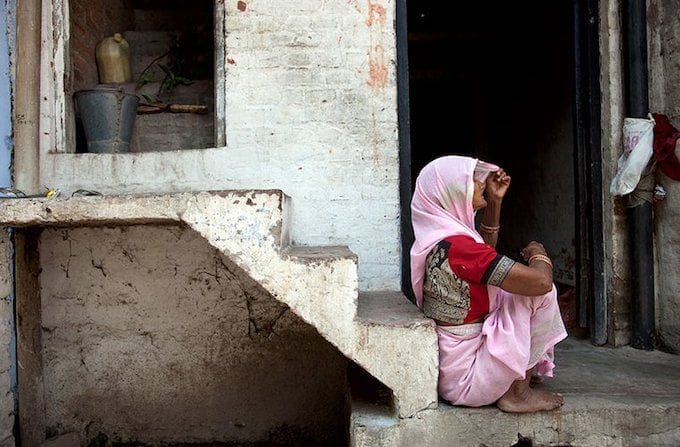DEBATE
Could basic income play a role in the fight against unfree labour?
The Self Employed Women’s Association (SEWA) is a women’s trade union in India, with two million members working in the informal economy. One of our on-going projects at SEWA has been to explore ways in which its members can overcome extreme insecurity. As part of this exploration we carried out three pilots, in which thousands of men, women, and children received a modest, monthly direct transfer unconditionally – a basic income. Their subsequent experience was monitored through surveys that compared their experience with a control group of thousands who did not receive the payments. The methodology and results are described in a book written by SEWA and the collaborators in the project, Guy Standing, Sarath Davala, Soumya Kapoor.
SEWA started its experimentation with a small study in Delhi. We substituted rations for poor families with cash put into bank accounts in the name of the eldest woman. We found that the women managed the cash well, choosing whatever their family needed. A group of women went together to buy food from the wholesale markets. They were not only able to afford better quality grain than usual, but were also able to add pulses, milk and eggs to their diet. Their nutrition improved.
The next two experiments were in rural Madhya Pradesh and involved over 11,000 individuals. About half received the basic income while the others made up the control group. Both women and men received a monthly income directly in their accounts. The children’s cash was paid to their mothers. This basic income was unconditional, individual, and universal within a single village.
Prejudice: a counterargument without substance
The benefits of having this extra money were once again plain to see, and as a result of these experiments SEWA became one of the earliest advocates of basic income in India. It is a way to reduce poverty and empower women at the same time. However, we find ourselves continually facing criticism for this view.
The arguments against cash transfers are emotionally appealing. One we hear frequently is that women will become dis-empowered because men will seize the cash to increase their consumption of liquor. Another argument is that women will drop out of employment with UBI, thereby reducing India’s already low female labour force participation rate even further. UBI will thus dis-empower women by pushing them back into the home.
SEWA’s experiments showed that neither of these claims is valid. On the contrary, we found that the transfers had five types of effect. Taken together, they show why a basic income could be transformative.
Basic income in effect paid for their start-up costs, and once the ball was rolling they were able to keep it going on their own.
First, there are welfare effects. The nutrition, health and schooling of girls improved more than for boys of similar age and social background, although boys also gained. The nutrition effect was greatest for girls aged from two to five years old. The gain in schooling was greatest for teenage girls, whose registration and attendance in secondary school rose significantly during our experiment.
The second effect can be described as equity. Not only did women benefit more in welfare, partially redressing deeply ingrained inequities, but women and men in lower-caste and tribal households tended to gain most. For many families, their basic income was their way out of exploitative debt.
Third, cash transfers in the form of a basic income have positive economic growth effects. While we saw no change in women’s labour force participation during our pilots, we observed that the sort of work women did changed to increase their incomes and agency. This happened through a diversification of production, with a big increase in own-account activities, especially farming, livestock and small businesses. Situations in which women engaged in multiple activities grew. This raised household earnings and further increased economic security, since if one activity had a setback they could rely on others.
In the tribal village covered by the pilots, 30% of women who received the basic income switched from wage labour to own account work like farming and livestock, and 73% reduced their debt burdens. Consider the example of Tulsa Bai, whose meager wage was rarely enough to cover her family’s needs. When she started receiving a basic income, Tulsa Bai saved the money, borrowed some more, and bought two buffaloes. She condensed the milk, which she sold to a sweet shop that used it as a raw material. The business strategy worked and Tulsa Bai does not need to work as a wage-earner anymore.
Fourth, for women there was an empowerment effect. Evidence from the pilots showed that an unconditional basic income helped women gain a voice in their relationships, in their families, and in the wider community. Many reported that the individual payments enabled them to participate more in household spending decisions. For example, over 54% in villages where the basic income was paid reported that household income was shared equally, compared to only 39% in villages where it was not paid.
Finally, the transfers had a positive effect on social ‘bads’. Several examples may highlight this. In many poor households, men’s drinking habits contribute to misery within the family as the men spend the money and become violent at home. Street crime and sexual harassment in public places also tend to increase with alcohol consumption. Now, UBI does not suddenly transform alcoholic men – that requires other measures. But over the 18 months of the pilot there was no increase in alcohol or tobacco consumption, and in some villages alcohol drinking actually decreased.
When asked why, many women attributed the change to the fact that families were investing more in productive assets and raw materials. This meant that the men had to work more and, according to the women, thus had less time to sit around and drink! At the same time women became more assertive. It was a common sight to see women, who previously had rarely left their homes, having meetings in public places to discuss their cash transfers, and in some cases protecting other women who had alcoholic and abusive husbands.

UBI for all
In recent years, there has been a considerable change in public discourse about UBI in India. When we started our first experiment in 2009, we were reviled as people who wanted to upset a pro-poor system of food rations. We even faced violence in the areas where the experiment was happening. We persevered because our members were frustrated with the existing schemes. There are more than a thousand schemes operating in India, each promising to reduce poverty, and some promising to empower women. And every year, more schemes are added with their own target groups and multiple conditions, confusing beneficiaries and make them prey to unscrupulous operators who often siphon off the benefits. Basic income is different. It is simple to understand, does not have conditions, is universal within a group, and is a cash transfer into the beneficiary’s bank account without the need for intermediaries.
In 2017, SEWA organised a major conference in Delhi to promote these ideas to Indian policy makers. The Indian Network for Basic Income was set up following the conference. That same year, the India Economic Survey recommended that UBI be made available to all women in India. In the run up to the 2019 Indian general election, we saw an amazing transformation in which many political parties because to announce their support for cash transfers as a new way forward in poverty reduction and income security programming.
Although the SEWA experiments were only for one year, their effect lasted much longer. A study conducted five years after the experiment ended found that while a few families had dropped back to their previous conditions, usually due to subsequent health shocks, many of the specific outcomes persisted due to sustained growth of income. The reasons this elevated income was sustainable was that during the first year of the pilot many households bought livestock and other assets, or began to farm their small plots that had hitherto been left fallow. Basic income had in effect paid for their start-up costs, and once the ball was rolling they were able to keep it going on their own.
Four years later, alcohol consumption seems to have continued to decline as well. Similarly, the villagers’ access to and understanding of health care had continued to improve, as has their attitude towards children’s schooling. Intra-household decision making also appeared to be becoming ever more balanced. Our pilots showed that basic income has the power to transform the lives of whole families, and especially those of women. Now it is time for India to take the next step and make basic income a reality for all.
This debate was financially supported by a grant from Humanity United.



























